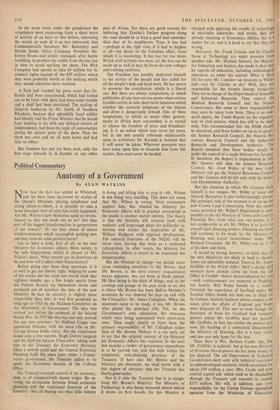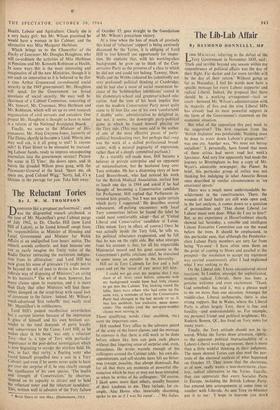Political Commentary
Anatomy of a Government
By ALAN WATKINS
Now that the dust has settled in Whitehall, and we have been harrowed by stories of the Queen's Ministers sharing telephones and sitting elbow-to-elbow, it is possible to take a more detached view of what has really happened. Are Mr. Wilson's new Ministries quite so revolu- tionary as they are made out to be? Are they part of the biggest transformation in government of the century? Or are they pieces of clever Window-dressing which accomplish nothing new and may even do some positive harm?
Let us have a look, first of all, at the new Ministry for Economic Affairs. Here, surely, is the new Department which is closest to Mr. Wilson's heart. What exactly are its functions to be, and how will it affect other Departments?
Before going into these deep questions, it is as well to get our history right. Judging by some of the stories one has read, one would think that eighteen months ago a few bright sparks from the Fabian Society sat themselves down and produced out of nowhere the idea of the new Ministry. In fact its ancestry is slightly more respectable than that. It was first proposed as long ago as 1918 by the Haldane Committee on the Machinery of Government. The idea was revived just before the outbreak of the Second World War. In 1947 the idea was not only revived but put into practice : Sir Stafford Cripps was appointed Minister with the same title as Mr. George Brown holds today. But the experiment lasted only a few months. Hugh Dalton resigned and Sir Stafford became Chancellor, taking with him to the Treasury the Economic Secretary (then a newish post) and the Central Economic Planning Staff. Six years later, under a Conser- vative government, the Treasury added to its spoils the Economic Section of the Cabinet Office.
The Treasury's overall control of the economy, then, is of comparatively recent origin. By re- viving the distinction between broad economic planning and the traditional function of the Treasury--that of finding out what little Johnny is doing and telling him to stop it—Mr. Wilson is not being very startling. This does not mean that Mr. Wilson is wrong. Most economists support him. But whether the Ministry for Economic Affairs will in practice correspond to the model is another matter entirely. The theory is that the Ministry will concern itself with medium- and long-range plans for paFticular in- dustries and (under the inspiration of Mr. William Rodgers) with regional development. The research functions of the NEDC will be taken over, leaving that body as a venerated talking-shop. In other words, the Ministry for Economic Affairs is meant to be important but unspectacular'.
But the Minister in charge—we should never cease reminding ourselves—is Mr. Brown. And Mr. Brown, as the most cursory acquaintance makes apparent, was not born to blush unseen. He likes being in the thick of things; and, in the comings and goings of the past week or so, this is where Mr. Brown has been. Before Monday's statement he was closeted for days on end with the Chancellor, Mr. James Callaghan. When the statement came to be made, it was Mr. Brown who played the principal role. Yet, on the Government's own admission, the measures which were being announced were short-term ones. They ought ' clearly to have been the primary responsibility of Mr. Callaghan rather than of Mr. Brown. Perhaps it is too early yet to say that the original concept of the Ministry for Economic Affairs has vanished. In the next few months a review of government expenditure is to be carried out, and this falls within the traditional, non-planning province of the Treasury. If here also Mr. Brown and his Ministry are dominant, we shall know with a fair degree of certainty that the Treasury has finally gone under.
Nor is it only the Treasury that is in danger from Mr. Brown's Ministry. The Ministry of Technology is also being menaced almost before it draws its first breath, for this Ministry is charged with applying the results of technology to particular industries: and surely, they are already claiming at Economics Affairs, this is matter for us; and it is hard to say that they are wrong.
Moreover, Mr. Frank Cousins and Sir Charles Snow at Technology are under pressure from another side. Mr. Michael Stewart, the Minister for Education and Science, has made it clear that he regards all education, including technological education, as under his control. What is there left for poor Mr. Cousins—an innocent in White- hall—and Sir Charles to do? Well, they are responsible for the Atomic Energy AuthoritY. They are in charge of the Department of Scientific and Industrial Research. They control the Medical Research Council and the Nature Conservancy. But some of these responsibilities may soon be taken from them. There is an awk- ward report, the Trend Report on the organisa- tion of civil science, which has still to be dealt with. This recommended that the DSIR should be dissolved, and three bodies set up in its place: the Science Research Council, the Natural Re- sources Research Council and the Industrial Research and Development Authority. The Report assumed that these bodies would be under the control of a single Minister for Science. If, therefore, the Report is implemented in full, Mr. Stewart will take the Science Research Council, Mr. Fred Willey at the new Land Ministry will get the Natural Resources Council and Mr. Cousins will be left only with the Indus- trial Development Authority.
But the situation in which Mr. Cousins finds himself is not unique. Mr. Willey at Land and Natural Resources is also embarrassingly placed. His principal task at the moment is to set up the new Crown Land Commission. Now this makes sense, provided Mr. Willey's Department is coin- parable to the old Ministry of Town and.CountrY Planning. But, from what one can gather, it is not comparable at all. Mr. Willey is to have no overall land planning powers. Planning decisions will continue to be made by the Ministry of Housing and Local Government under Mr. Richard Crossman. All Mr. Willey can do is sit at his desk and think.
It would be wrong, however, to think that all the new Ministries are likely to lead to clashes. Some are splendidly isolated. There is Mr. James Griffiths at the Welsh Office. Half a dozen civil servants have already come up from the old Office at Cardiff—there's decentralisation for you —and reinforcements are expected at Padding- ton hourly. Will Wales benefit as a result? Certainly the experience of Scotland under the Scottish Office would not lead one to think so. In Cabinet, Scottish business always tended to be taken after the affairs of England and Wales were disposed of. This was so even though the Secretary of State for Scotland had statutory powers which Mr. Griffiths does not possess. Mr. Griffiths, in fact, has neither the powers nor, now, the backing of a substantial Department, the Ministry of Housing. His is a lone voice: and one can only hope for the best.
Then there is Mrs. Barbara Castle. She, like Mr. Griffiths, is isolated: but at the new Ministry of Overseas Development she has more money'
oney at her disposal. The old Department of Technical Co-operation dealt only with technical assistance to underdeveloped countries, which accounted for about £30 million a year. Mrs. Castle will noW control capital aid, which used to be channelled through the Treasury and amounts to around £175 million. She will, in addition, take over responsibility for the United Nations specialised agencies from the Ministries of Education,
Health, Labour and Agriculture. Clearly she is a very lucky girl: but Mr. Wilson promised he would have a woman in his Cabinet, and the alternative was Miss Margaret Herbison.
Which brings us to the Chancellor of the Duchy of Lancaster, Mr. Douglas Houghton, who will co-ordinate the activities of Miss Herbison at Pensions and Mr. Kenneth Robinson at Health. In some ways this is the most interesting and Imaginative of all the new Ministries, though it is not such an innovation as it is believed to be (for a time Arthur Greenwood co-ordinated social security in the 1945 government). Mr. Houghton will speak for the Government on broad questions of social security. He may well be chairman of a Cabinet Committee, consisting of Mr. Stewart, Mr. Crossman, Miss Herbison and Mr. Robinson, which will set up its own research organisation of civil servants and outsiders. One project Mr. Houghton is thought to have in mind is a reform of the National Assistance Board.
Finally, we come to the Minister of Dis- armament, Mr. Alun Gwynne-Jones, formerly of The Times, shortly to become a Lord. Where, one may well ask, is it all going to end? Is anyone safe? Is Fleet Street to be menaced by maraud- mg Labour bands, ready to impress unsuspecting Journalists into the government service? Picture the scene in El Yino: the.doors open, and in bursts the dreaded Wilson press gang, with the Paymaster-General at the head. 'Spare me, oh spare me, good Colonel Wigg."Sorry, lad, it's a lifetime in the peerage for you. Take him away.'



































 Previous page
Previous page